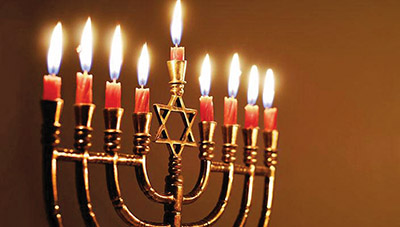
This dvar Torah is dedicated l’ilui nishmas my mother in law Rebbetzin Ita Singer, Ita bas Pinchas, a”h, who passed away Friday, 20 Kislev, December 8.
There really is something special about Chanukah that tugs at the Jewish heart. Regardless of how observant (or not) they are, Jews around the world observe the lighting of the menorah. Why is Chanukah the holiday that is so widely observed by Jews of all backgrounds? The following story will shed some light.
Joe Wallis was a non-observant Jew living in Israel. His wife asked him to pick up dinner for the family. On his drive home, he stopped at the Elephant Steakhouse, famed for selling non-kosher meat. Waiting patiently in line, his mind began to wander to a story his mother had told him. His grandfather, Rabbi Shraga Feivel Winkler, was in the slave labor camp of Debrecen during World War II. One morning, the head Nazi guard assembled all the Jews and said, “The war is almost over. In a few hours the Russians will be here and you will be free. But before we go, I have one final test of how religious you think you are.” He ordered Joe’s grandfather to step in front of the assembled crowd. “Rabbiner, eat a piece of this pork and you will be free to go. If you refuse, I will shoot you on the spot,” said the guard as he placed his pistol on Rabbi Winkler’s temple. “No, I will not,” said Shraga Winkler. “You stupid Jew,” yelled the guard, “eat the pig now and you shall live and restart your life. If you refuse, I will shoot you and you will be the last Jew to be killed at Debrecen.” Rabbi Winkler refused and fell to the floor, dead from the bullet in his head.
Joe Wallis thought to himself, “Here I am standing in line to purchase pork to feed my wife and children! And my grandfather chose to be killed rather than eat a piece of pork!” He left the restaurant and picked up burgers for dinner instead. Thus began Joe Wallis’s search to learn about Torah and mitzvos. Now, Rabbi Joseph Walles is the CEO of Arachim, an extremely popular and successful kiruv organization.
Let’s look at the Chanukah story. The Chashmonaim were just a few men who waged war against the mighty Greek army. The Greeks were the superpower of the world. The Chashmonaim, meanwhile, were kohanim trained for the service in the Beis Hamikdash. They were most definitely not trained or skilled warriors. They did not have any hope of winning. They fought because they wanted to demonstrate that keeping Torah and mitzvos was worth dying for.
If we observe a mitzvah today, it’s because our parents were dedicated to that mitzvah and passed it onto their descendants. That is why Jews from all backgrounds connect to Chanukah and the menorah. Although Shraga Winkler surrendered his life, he implanted a seed of pure love and caring for Hashem’s mitzvos, which germinated years later in his grandchildren. Similarly, the Chashmonaim implanted a deep connection to Yiddishkeit by preserving the purity of all mitzvos.
The Nesivos Shalom explains that the conviction of the Chashmonaim to preserve the absolute sanctity of Torah and mitzvos is seen once again in their refusal to light contaminated oil, even though there was a halachic exception that would permit it under the circumstances. Additionally, they could have shaved the wicks down into an eighth of the thickness, allowing the oil of the one flask to naturally last for eight days. However, the Chashmonaim wanted to perform Hashem’s will to the fullest.
We see this dedication in how we light our Chanukah candles today as well. In the laws of Chanukah, even though the base requirement is to light one candle per night per home, the actual law adopts the highest of the three tiers of observance found in the Shulchan Aruch—mehadrin min hamehadrin—the most beautiful way to perform, by lighting one additional candle each night. This is part of our legacy from the brave Chashmonaim.
The willingness to surrender one’s life for one’s ideals is called mesiras nefesh (giving over one’s soul), as was the case of the Chashmonaim. Mesiras nefesh also means to give everything we’ve got toward a mitzvah.
When we light the menorah, we should think about the sacrifice and dedication of our ancestors. As we add a candle each night, this should fan our flame of devotion and inspire us to go the extra mile for Hashem. May Hashem respond in kind by performing miraculous wonders and bringing us the ultimate redemption speedily in our time!
By Rabbi Baruch Bodenheim
Rabbi Baruch Bodenheim is the associate rosh yeshiva of Passaic Torah Institute (PTI)/Yeshiva Ner Boruch. PTI has attracted people from all over northern New Jersey, including Teaneck, Bergenfield, Paramus, Rockaway and Fair Lawn. He initiated and continues to lead a full multi-level Gemara learning program in the evenings, gives Halacha and hashkafa shiurim on Shabbos and, more recently, has spread out beyond PTI to begin a weekly beis midrash program with in-depth chavrusa learning in both Livingston and Springfield.










